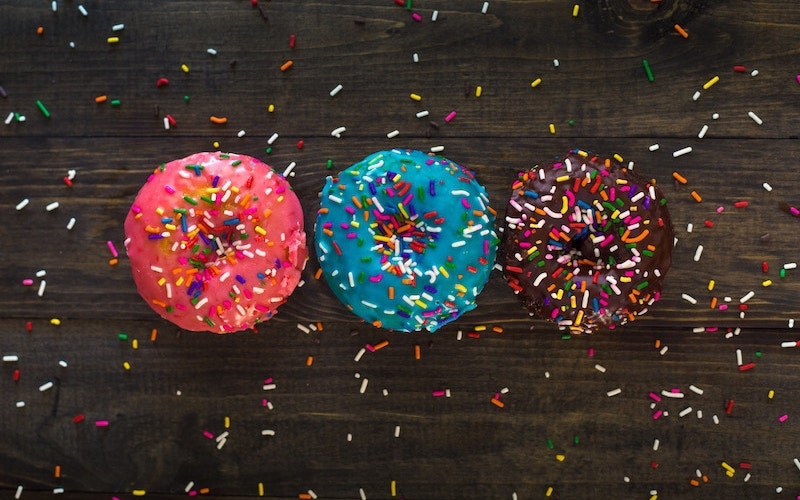Products of Glycation Are the New Cholesterol: Why to Avoid Sugar
Episode #4 of the course Hack your diet: Using nutrition science to live healthier, longer, and diet-free by John Robin
Welcome to our fourth diet hack!
Yesterday, we learned about the staple foods that keep us healthy:
• Eat mostly fruits and vegetables.
• Add nuts and seeds and whole grains.
• Limit meat and dairy.
I also told you not to worry too much about restricting your diet. Instead, we’re going to take a positive approach: learning to love the foods that are healthy.
Even better, we aren’t going to punish ourselves for eating bad foods. The goal of this course is to fall more and more in love with healthy foods—learning to enjoy their tastes by associating them with reasons they are good for you.
But I’m also going to teach you more about why bad foods are bad, so you’ll see more reason to want to limit them, and the best place to start is with sugar.
Products of Glycation: The New Cholesterol on the Horizon
I once read an impressive obituary. It was that of Dr. Lloyd Bartlett, who worked as a doctor until age 100. He died at 101, nine months after retiring. All his working life, he kept up with his research, especially relating to nutrition, and in his last years, he was quite interested in a topic called glycation—“the new cholesterol,” as he referred to it with his daughter.
Glycation is indeed a newer concept in science, but it is as important to health as cholesterol. Glycation is the process of bonding sugar to protein or fat, as occurs in high-heat cooking, especially in:
• donuts
• cake
• barbequed meat
• dark soda (cooked glycation end products are added to the soda as a flavor enhancer)
When ingested, foods that have undergone glycation break down into waste products that interfere with the basic functions of molecules in our cells, and some of these waste products might even be implicated in dementia and cancer, though the science is still relatively new.
One of the worst foods you can eat is french fries. This is because most restaurants that make them add sugar to the oil to enhance browning. You wouldn’t know because the sugar loses its sweetness when it undergoes glycation. This is important to know because it shows how “avoiding glycation” isn’t just about avoiding things that are sweet. Sugar can creep in where you least expect it!
This is one reason cooking your own food is important. As you work your way through yesterday’s list of healthy staple foods, you’ll notice none of them involve glycation at all. You can control entirely how they go from raw form to the version you put in your mouth.
The next time you order french fries, associate the taste of the fries with your newfound awareness of glycation and what it’s doing to your body. When you eat french fries or donuts or drink dark cola, you can appreciate why you want to limit them to occasional treats.
It’s worth stopping to talk about sugar in general.
Table sugar, known as sucrose, is bad for you. I’ve included an article by Healthline at the end of the lesson if you want to read more about it [1], but for the sake of this course, let’s summarize what science tells us about consuming too much (over 50g/day) of it:
• It causes excess weight gain, specifically visceral fat (the kind that makes your belly protrude).
• It raises cholesterol and triglycerides, which can clog your arteries.
• It can increase the risk of diabetes.
• It drains your energy via blood sugar crashes.
Fruits have sugar, but these are in the form of fructose, not sucrose. Honey is also not pure sucrose, as you’ll appreciate in another article I’ve included [2]. The takeaway of all this advice about glycation and sugar in general is that not all “sweet” is bad. Indeed, as we saw with french fries, sometimes sweet can be hidden, so really, your goal is simply applying this awareness to your mindfulness of healthy food choices.
Action: Meditate on Sweet, with Knowledge
I want you to get a donut or a piece of cake, and meditate on the taste experience, just like you have done and will keep doing with healthy foods. Pay attention to the experience of it, especially paired with knowing about glycation. Imagine all the things going wrong in your body from the unhealthy chemicals in this food that tastes so good. Try to think of this as a treat you can enjoy but why it should be a treat, not a regular food.
Tomorrow, we move on to meal size and why smaller meals are better.
Recommended reading
An article about Dr. Lloyd Bartlett’s impressive 70-plus-year career
References
[1] Eleven Reasons Why Too Much Sugar Is Bad for You
[2] Ten Surprising Benefits of Honey
Share with friends

